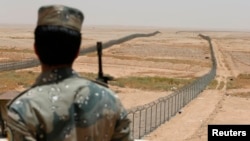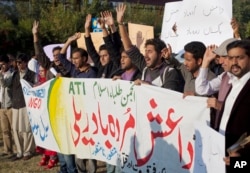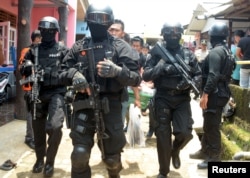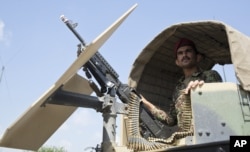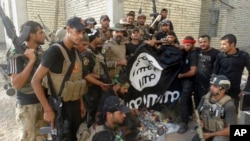Confusion reigns in the capitals of largely Muslim nations over Saudi Arabia's plan, announced Tuesday, for 34 of the countries to join forces in the fight against terrorism.
While the plan has met with favorable remarks from members of the proposed new coalition, there are questions as to the extent of the cooperation. Also unclear is how deeply nations will become involved militarily — if at all.
There are also doubts about Saudi motives and the kingdom's strong links to a puritanical form of Sunni Islam which critics say only fuel movements like the Islamic State group. Saudi Arabia is a member of a U.S.-led mostly Western coalition fighting IS, but its participation has been limited.
The Saudi Muslim alliance that was announced Tuesday is aimed at fighting terrorism in the region, according to Saudi officials, who stopped short of providing details as to how it will work.
The proposal caught U.S. and Russian officials off guard, as they found out about it mostly from media reports, according to news accounts.
"We expect that we'll get some detailed information from the sponsors of this process," said Russian Foreign Minister Sergei Lavrov during a news conference earlier this week with U.S. Secretary of State John Kerry in Moscow.
Still, some coalition members said they were shocked to see their names on the list.
No decision in Pakistan
Pakistani Foreign Secretary Aizaz Chaudhry told journalists he was surprised to read the news that Saudi Arabia had named Pakistan as a part of the alliance.
The spokesman of the foreign office, Qazi Khalil Ullah, said his country has not yet decided whether to join the coalition.
"The final decision regarding [being] part of the alliance has not been taken yet, and Pakistan will formally announce its decision," he told VOA.
Pakistani officials have confirmed to different media outlets that Islamabad's policy is not to deploy troops outside of the country except for United Nations missions.
"States need to take actions and change policies separately; alliances usually do not deliver on long-term goals," retired Pakistani Brigadier Sayed Nazir told VOA.
Surprise in Indonesia
In Indonesia — the world's largest Muslim country — a Foreign Ministry spokesperson, Arrmanatha Nasir, said his country was also surprised by the Saudi move.
He said in a news conference that the Saudi foreign minister contacted his Indonesian counterpart on Friday, informing him of a decision to "establish a coordinating center for combating extremism and terrorism, not a military alliance."
Indonesia has expressed its solidarity with the alliance, but is not yet a part of it.
Uncertainty in Bangladesh
Officials in Bangladesh are not certain what its role would be in the proposed coalition.
"It's important for the people of Bangladesh to know what role their government is going to play in this coalition," Bengali security analyst General Muniruzzaman told VOA.
Potential in Afghanistan
In Kabul, Afghan officials have tacitly welcomed the formation of a Muslim alliance against terror.
A spokesperson for Afghanistan's Interior Ministry said on Wednesday that the country was at the forefront of war against terror, including the recent fight against IS.
Saudi Arabia has invited Kabul to join the alliance against terrorism, and Afghan officials say they are considering it.
"If this alliance takes shape, it will be a psychological blow to the terrorists," said Nasrullah Stanikzai, a professor at Kabul University.
"An alliance of Muslim countries, which will try to defeat the terrorists, will play an effective role," he told VOA's Afghan service.
Optimism in Turkey
In Turkey, Foreign Ministry spokesperson Tanju Bilgic said in a news conference that the alliance intends to coordinate efforts in terms of military, intelligence and ideological issues in the fight against terrorism.
"It's important that countries that struggle against terror have a common voice," he said. "We think that this meeting is an important step taken toward the right way."
Doubt in Iraq
In the Kurdistan region of Iraq, where Kurdish fighters are taking center stage in the fight against IS terror, people are skeptical about the new alliance.
"This alliance will bring more complication to the situation," Jabar Qadir, a Kurdish policy expert based in Irbil, told VOA's Kurdish service.
He said the Islamic alliance against IS would unlikely be effective, "because it's driven by sectarian [Sunni] motives and it's a way to respond to the expansion of Iran and the Shi'ite militias in the region."
The 34-state alliance consists of only Sunni Muslim nations.
Iran, a Shi'ite Muslim country which is not part of the coalition, expressed reluctance toward the Saudi initiative, analysts say.
In Egypt, which is part of the coalition, Al-Azhar, the most prestigious Islamic institution in the world, welcomed the decision, urging all Muslim nations to join the alliance.
The Cairo-based school called this formation a "historic" step in efforts to defeat "the evils of terrorism."




